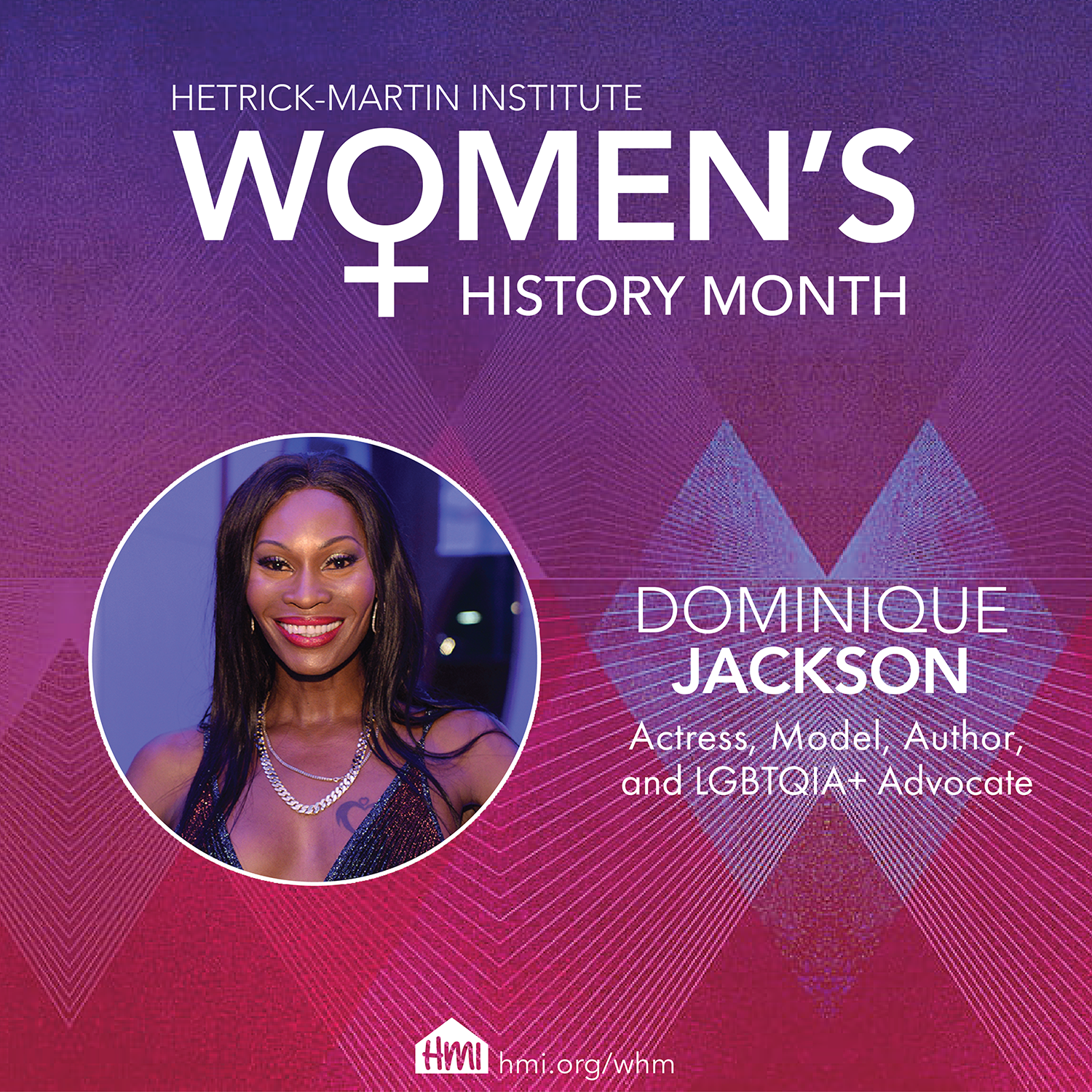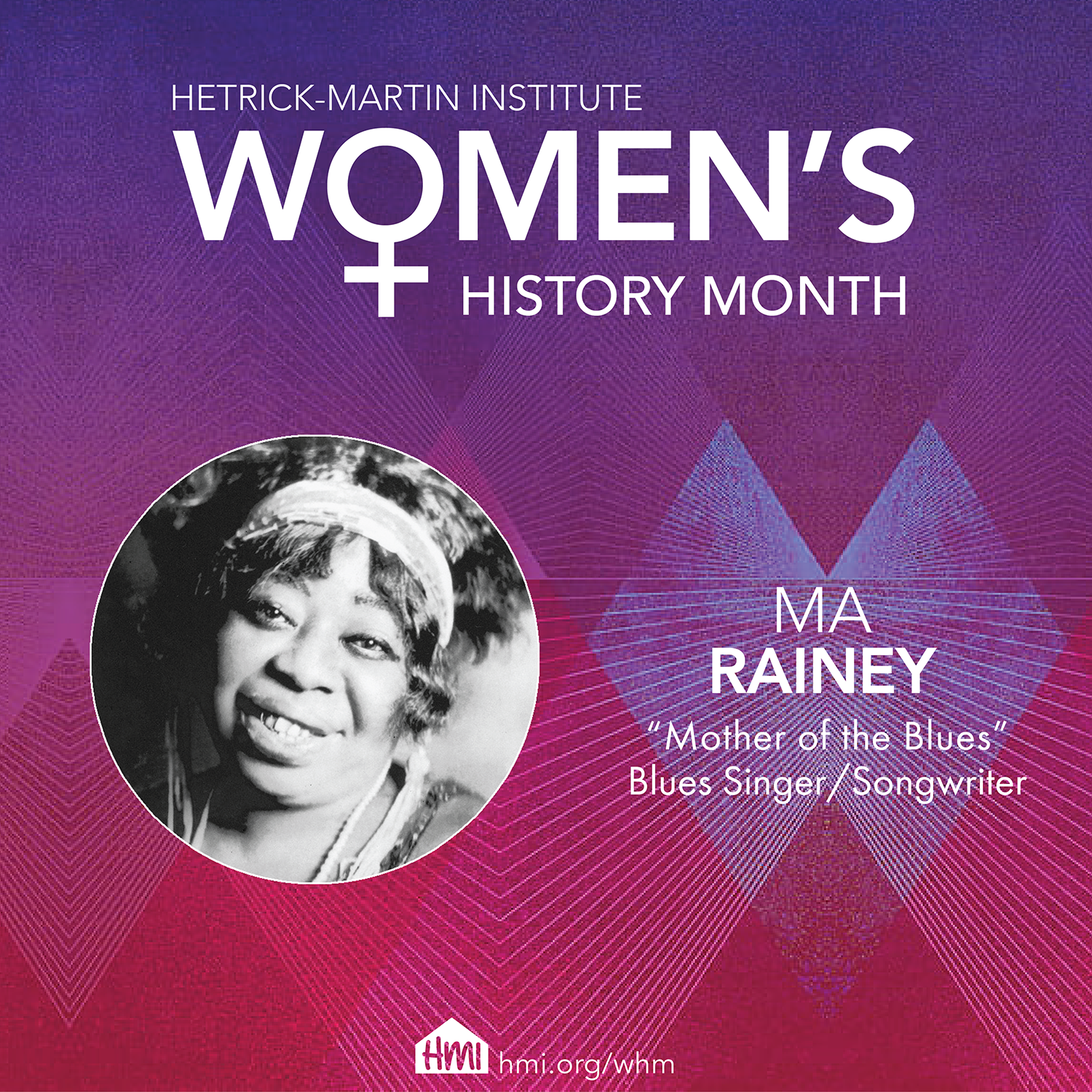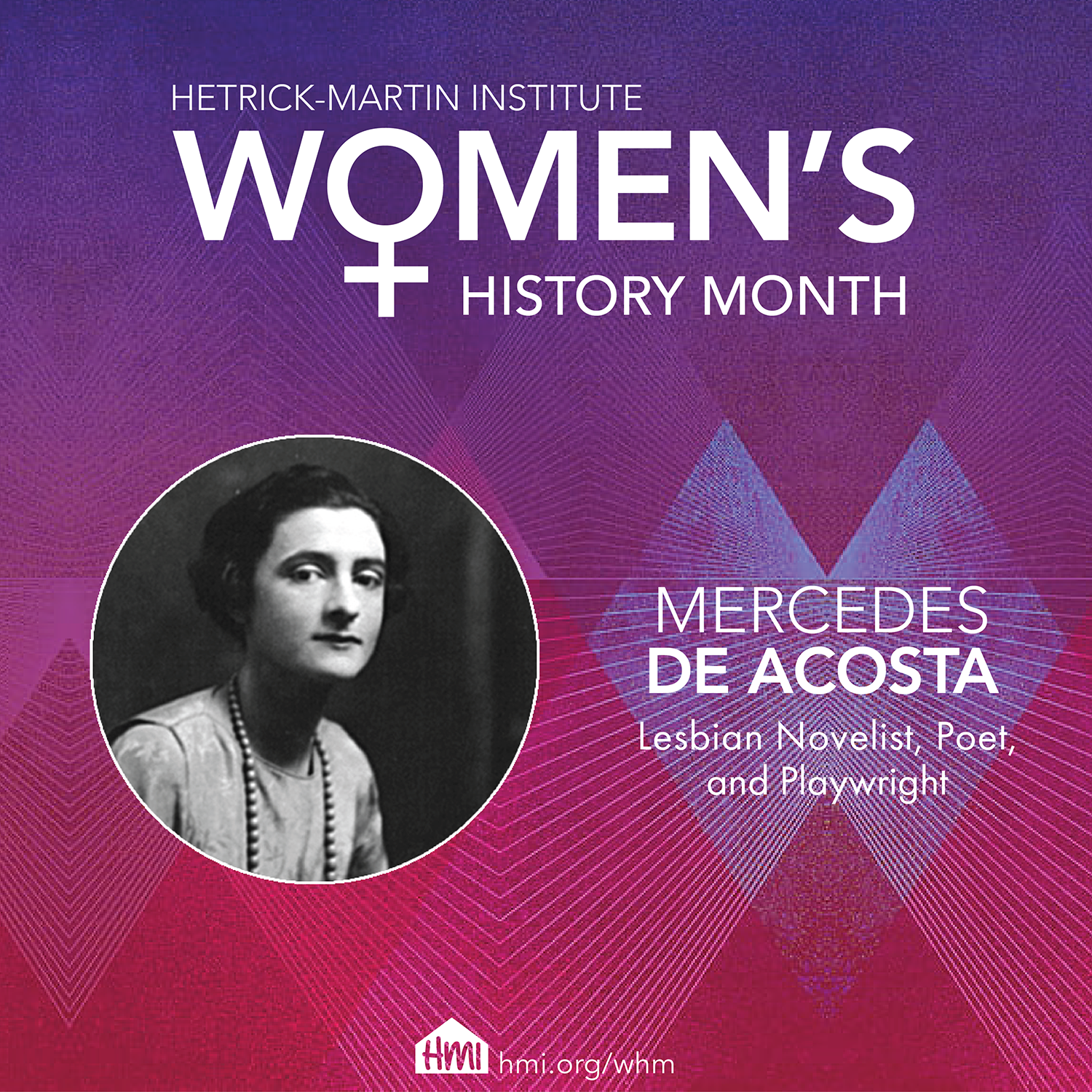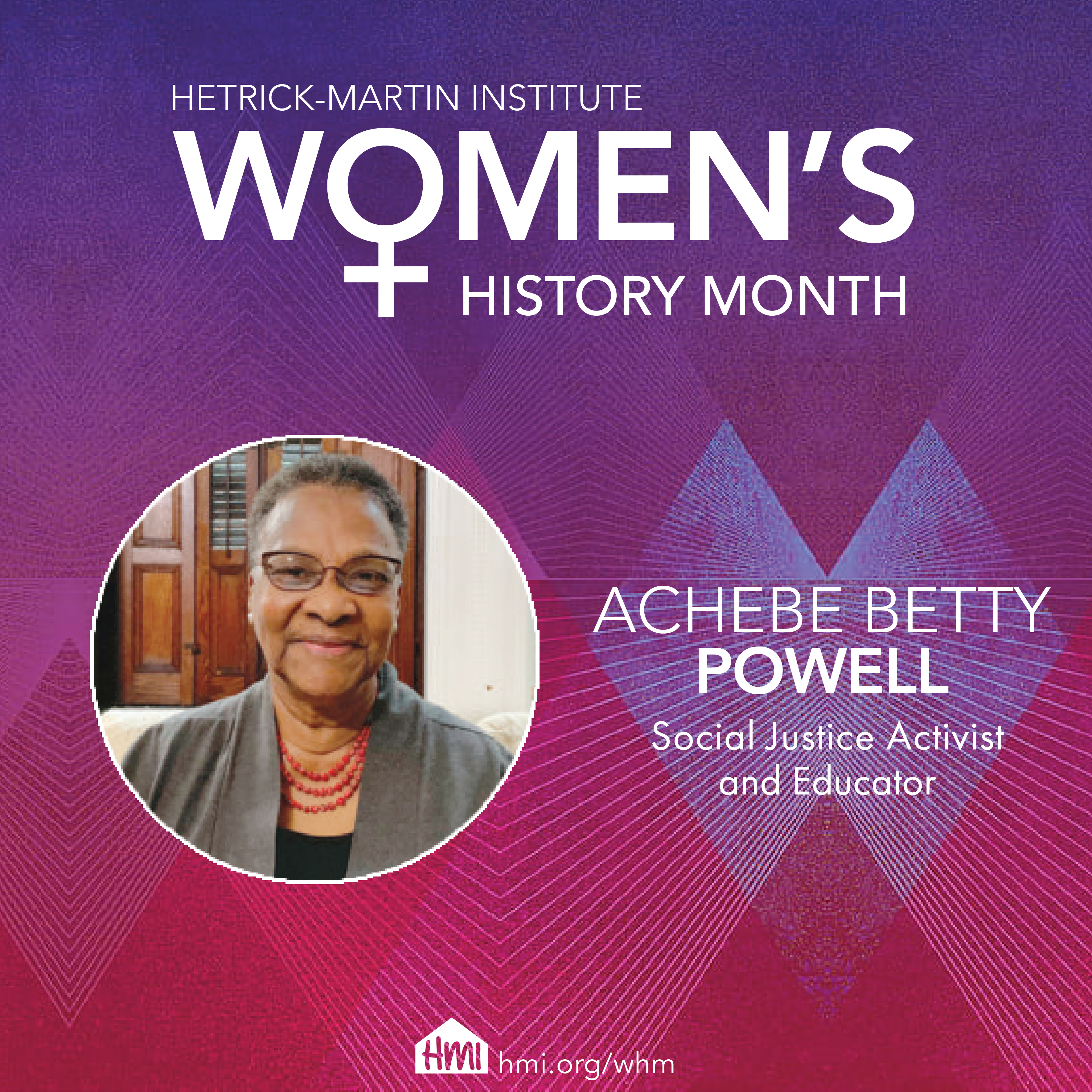HMI celebrates Women’s History Month
Hetrick-Martin Institute is recognizing LGBTQIA+ women, every Wednesday throughout the month of March, for their achievements and contributions to the community.

As Women’s History Month will come to a close this week, we thought it was fitting to spotlight special friend to Hetrick-Martin Institute—activist and 2021 Emery Award Honoree, Dominique Jackson. The multi-talented actress, author, and model has used her platform to make significant strides in paving the way for the trans and LGBTQIA+ community. Her resilience and perseverance can be attributed to her crowning achievements and contributions as a trans woman of color. This, by the way, is the same person who, at the age of 15, fled to the US to escape the traumatic situation in her home country of Trinidad and Tobago. Her remarkable life’s journey is why we pay tribute to Dominique today, just two days before Trans Day of Visibility (TDOV).
After experiencing homelessness and rejection from her own family, Dominique made it her mission to shed light on the challenges transgender women like herself frequently face. She has served on the Community Health Program Board at the Montefiore South Bronx Healthcare Clinic and has been invited to speak at numerous events and conferences, where she has shared her experiences as a transgender woman of color and has advocated for greater visibility and acceptance for the trans community. In 2021 to a room full of students, staff, and attendees in Princeton, NJ, she said, “I went through the fire, now I am the fire,” which is no better way to describe what this incredible trans woman has achieved.
She has received multiple awards for her contributions over the years including the National Equality Award at the Human Rights Campaign National Dinner, the Visionary Award at the TransNation Festival in Los Angeles, Harlem Pride’s Legacy of Pride Award, the Bronx LGBT Leadership Award, and was honored with the New York State Assembly Citation issued by Mark Gjonaj in 2017. And of course, in 2021 she was honored at HMI’s Emery Award ceremony.
In 1993, Dominique was introduced to the ballroom scene while living in Baltimore, Maryland. She eventually moved to New York City getting involved with the ballroom scene here. In a 2018 interview she shared her experience with the NYC ballroom scene, “I met these women, some of the most beautiful girls I’ve ever seen. I knew I wasn’t gay and I wasn’t straight, and now I realized that I could be a woman.” More than two decades later after being introduced to the ballroom community, she was inducted into the House of Ballroom Hall of Fame, deemed iconic, at the 2016 NYC Ball Awards.
In 2000, Dominique began her illustrious career in modeling, working with fashion designers such as Thierry Mugler and Jean-Paul Gaultier. She has modeled for Vogue España and has been featured in magazines such as Essence and Paper. Her modeling career has continued through the years, gracing catwalks across the globe. Two years to this week, she walked Mugler’s Spring 2021 Runway Show with fellow trans model, Hunter Schafer, on TDOV, where they “owned the show”. Most recently, she walked the Mugler runway show for Paris Haute Couture Week and shortly after, closed the show for The Blonds at New York Fashion Week, dressed befittingly, as the giant diamond she is.
After years of hitting the catwalk, Dominique eventually transitioned to acting, making her television debut in 2016 on Oxygen Network’s docuseries, “Strut”, produced by Whoopi Goldberg and Tom Leonardis, which earned her a GLAAD Media Award nomination. Two years later, she made her debut as Elektra Abundance to much fanfare in the FX series, “Pose”, which was centered around NYC’s Black and Latino ballroom scene in the 1980s and 1990s. The scripted network, which included the largest cast of transgender actors, was award multiple Emmy Award nominations and wins. Dominique, herself, has been recognized for her acting, receiving numerous nominations and wins from Essence Black Women in Hollywood, Hollywood Critics Association Television Awards and the MTV Movie + TV Awards, to name a few. Aside of all the accolades, playing the role of Elektra was an opportunity for Dominique to show mainstream America the trials and tribulations that many trans women go through, even to this day.
She has written about her experiences in her memoir, “The Transsexual from Tobago“, in which she opened up about her mental health struggles. Dominique has been an advocate for social change and transgender rights, speaking out against discrimination and violence faced by trans individuals. She has also been a vocal advocate for Black Lives Matter, speaking out against police brutality and systemic racism.
Please join us in celebrating Dominique Jackson for her innumerable contributions to our community.

As part of our ongoing Women’s History Month series, today we proudly feature LGBTQIA+ activist, Crystal Jang. Although she has been involved with various LGBTQ organizations for over 40 years as a community organizer, participant and youth advocate, Crystal is likely well-known in the community for being one of the Asian Pacific Islander Queer Women and Transgender Community (APIQWTC) co-founders. The San Francisco based organization founded in 1999 is a grassroots organization that focuses on building community and providing support for queer Asian Pacific Islander women and transgender people. Crystal also co-founded Older Asian Sisters in Solidarity (OASIS), prompted by her “frustration with the lack of mature lesbian groups in San Francisco.” OASIS, which today is part of APIQWTC, provides support and services for older Asian and Pacific Islander women in the San Francisco Bay Area, focusing on health, social justice, and intergenerational connection issues.
Her advocacy work in the community began well before launching APIQWTC. She petitioned to be the first woman mascot at her high school, defied the rule forbidding women to ride the outside of the cable car, spoke on college campuses about API-LGBT issues, and participated in the first San Francisco Health Department trainings on gay issues. Crystal was also involved with the Asian Pacific Sisters, the Queer Asian and Pacific Islander Alliance, and the Asian Pacific Lesbian and Bisexual Network prior to founding APIQWTC.
A 4th generation Chinese American, Crystal came out at the age of 13 in 1961. She has devoted her life’s work to advocating for a range of issues from LGBTQ equality to immigrant rights. She has been involved and participated in the Asian American, the anti-war, the feminist and ERA campaign, and the Ethnic Studies movements.
She was the first Middle School Coordinator for Sexual Minority Youth and Families in San Francisco’s Unified School District (SFUSD) and the first Asian Pacific Islander in the district to publicly identify as LGBT. She helped coordinate the first district-wide LGBT sensitivity trainings and the very first staff training on transgender issues for SFUSD. Crystal helped develop and implement training to educate more than 3,000 staff on issues affecting queer youth and families in schools.
Crystal is married to her longtime partner Sydney Yeong, who together have an adopted daughter, Cameron. In 2013, she was named San Francisco Pride Parade’s Grand Marshal and received the Phoenix Award at APIQWTC’s Lunar New Year Banquet. That same year, in a Bay Area Reporter article, she said, “I came out among white lesbians, because that’s who accepted you. It was an adventurous time, but I couldn’t find anyone who represented me. The only time I was ever called a ‘slanty-eyed bitch’ was in a gay bar.” This was the catalyst for her fight and advocacy for Asian LGBT visibility. We’re grateful for Crystal’s commitment and life’s work as an LGBTQIA+ activist, educator and youth advocate.

Today, we celebrate the “Mother of the Blues”, Gertrude “Ma” Rainey for Women’s History Month. Born Gertrude Pridgett in 1886, she would later become known for being one of the most influential blues singers of all time, as well as a strong-headed businesswoman and liberated bisexual. According to historians, Ma led an intriguing and complicated life. She was well aware of what was what and how to get her way, even if it meant pushing both white and black people aside. Ma fought for respect and artistic independence.
And while she is considered the pioneering artist who blended traditional southern blues and vaudeville, influencing the greats like Billie Holiday and Bessie Smith, her legacy had been overlooked for many years. It was until 1982, when playwright August Wilson wrote “Ma Rainey’s Black Bottom”, that she really began to get her due recognition. The play, chronicling the life of Ma Rainey and the exploitation of Black recording artists by white producers, won a New York Drama Critic’s Circle award in 1984 and received a Tony Award nomination for Best Play. The success of the play led to two revivals in 2003 on Broadway and in 2016 on London’s West End, with Whoopi Goldberg playing the role of Ma Rainey in the 2003 revival. In 2020, “Ma Rainey’s Black Bottom” was released as a film, starring Viola Davis, which would go onto receive multiple nominations and wins at the Academy Awards, Golden Globes and many other award ceremonies.
Her music and style influenced many successful artists such as Louis Armstrong who played with her on several recordings, Janis Joplin and Bonnie Raitt. It was also through her music that she helped shed light on the Black American woman. Her songs were about her personal experiences, as well as other Black women, revealing anguish, rage, love, and sexual desire. Author Kimberly Mack said, “Through storytelling in both the words that she sang and also her lifestyle, she fought against heteronormative ideas of what a woman should be.” Novelist and political activist, Alice Walker said Ma Rainey’s music was instrumental in helping shape the characters in The Color Purple. She said, “I loved the way they dealt with sexuality, with the relationships with men. They showed you had a whole self and you were not to succumb to being somebody else’s—as they would say—’play toy.’”
Ma Rainey was also unapologetic about her bisexuality. She didn’t hold back in hiding it and according to author, Sandra Lieb, would sing about “sissy men” and mannish women uninhibited and seemingly without judgment. When she was 18, she married William Rainey who she would later separate from 12 years later, after a decade of performing and touring together. Some claim she remarried although very little is known about her second husband. However, rumors about her relationships with other women began surfacing after she was arrested in 1925 for throwing an “intimate party” with some of her female dancers in Chicago. Bessie Smith, who was allegedly one of her lovers, was the person who bailed her out of jail. Her song, “Prove It On Me Blues” suggested her attraction to and affinity for women with lyrics, “Went out last night with a crowd of my friends. They must’ve been women, ‘cause I don’t like no men. It’s true I wear a collar and tie.” Her record label, Paramount, later released an ad for the song with her wearing a men’s three-piece suit, mingling with two other women.
Ma Rainey was an immensely talented songwriter, who not only was one of the first recorded blues musicians, but recorded more than 100 singles. She would later be inducted into both the 1990 Blues Foundation and 1990 Rock & Roll Halls of Fameand four years later, be honored on a US postage stamp. In 2007, her Columbus, GA home was converted into a museum to honor her. Thank you, Ma Rainey, for shaping the way of music, paving the way for women, and inspiring the American dream.

Today we’re spotlighting Mercedes De Acosta as part of our #WomensHistoryMonth series. Although Mercedes had a series of talents including poet, novelist and playwright, to name a few; she is best known for her intimate relationships with some of the most famous women including Greta Garbo, Marlene Dietrich, Tallulah Bankhead and more. Often labeled as an unapologetic and controversial lesbian at a time when same-sex love was considered taboo, Mercedes helped pave the way for lesbians and the queer community.
She was born in 1893 in New York City to wealthy parents, who often would entertain neighbors such as President Theodore Roosevelt and the Vanderbilts. She considered herself a boy until age 7, which was encouraged by her parents who dressed her in boys clothing and allowed her to participate in male-centric activities. It wasn’t until a male playmate exposed his genitalia to her that she realized she was not a boy. Her parents eventually tried to make her more feminine by sending her to convent school. She would eventually run away, telling the nuns she “will never fit in anywhere” and would be lonely her entire life because she didn’t know what gender she was.
She led a prominent and colorful life intermingling with Hollywood and Broadway personalities and maintaining friendships with prominent artists including Andy Warhol in her later years. She was married to painter Abram Poole from 1920 to 1935, during which time she had affairs with other women.
At the age of 67, Mercedes published her tell-all autobiography, Here Lies the Heart, which referenced her lesbian relationships without directly mentioning their names. Several of the women felt they had been outed including Greta Garbo, who never spoke to her again after 30 years of friendship.
For most of her life, Mercedes enjoyed wealth, glamour, and fame. Sadly, her health began to deteriorate in the 1960s. She died in poverty and obscurity in 1968. While many only knew one side of Mercedes, her biographer Robert Schanke referred to her as an “exceptionally lively, intelligent and dynamic person who had many devoted friends.” He labeled her a “brave lesbian of her times” and suggests that the degrading portrayals of her may be a result of “the deep homophobia of her generation.”
Mercedes was an ardent advocate for women’s rights and will be remembered for the mark she left, helping create a path forward for lesbians and the queer community.

We are launching #WomensHistoryMonth by remembering social justice organizer and educator, Achebe (Betty) Powell, who recently transitioned from this world on February 21st. Many of us at HMI had the great fortune of knowing and working with her. Achebe served as an amazing anti-racism, equity and inclusion consultant and community leader for Hetrick-Martin Institute. We continue to mourn the loss of our wonderful friend and are deeply grateful for all she brought to us at HMI over the years.
Achebe was the first Black woman to have a leadership role in the lesbian and gay liberation movement in the 1970s, according to the National LGBTQ Task Force, where she served as board of directors co-chair for several years. In 1977, Achebe co-founded the Astraea Lesbian Foundation for Justice. The foundation began as a small group of women to address the lack of funding for women—specifically lesbians and women of color. She remained active with the organization for 45 years and discusses in this short video how Astraea came about and how it evolved to where it is today. Achebe’s visionary leadership early on was largely responsible for Astraea’s position as a major leader in the global-social-justice-feminist LGBTQIA+ movement.
The same year Astrea was founded, Achebe joined other lesbian and gay leaders at the White House for a historic meeting with the Carter administration, where they communicated grievances about discriminatory federal policies and offer recommendations to improve policies and services to the LGBTQ community. Achebe later served as director of the Kitchen Table Press—the first women’s press to focus specifically on the voices and stories of women of color. She was a founding member of the Salsa Soul Sisters collective, now the oldest Black lesbian and lesbians of color organization in the U.S.
In her earlier years, she spent her summers working with the Neighborhood Youth Corps in East Harlem, focusing on educating young people, particularly Black and Latino who had been dismissed by the system or had been dropped through the cracks. She says it was the nature of the adolescent youth’s lives she counseled, who were deemed “destined for prison and drugs”, but instead defied all obstacles and negative assessments of themselves, which ultimately “informed her politics”.
Achebe also founded a racial diversity consulting firm, Betty Powell Associates, assisting a broad range of organizations across the country—everything from universities and schools to health service providers and community agencies—to become more inclusive and highly functioning diverse institutions. She conducted diversity and social justice trainings for international feminist groups, often praised as a “dynamic consultant on diversity and multicultural development issues”. She was a true inspiration, with a knack for getting individuals to be open to sensitive issues and pledge a renewed commitment to the challenge of multicultural living.
Achebe was a pioneer in bringing together work on racial justice and intersectionality with transnational discussions of gender, race, and culture. She was featured in the award-winning documentary Word Is Out. In a 1979 interview with NPR, Achebe said she was initially shocked by the how much the filmmakers muted her feminism but when reviewers referred to her as “the militant lesbian”, she understood why they chose to downplay her politics.
Achebe celebrated being a lesbian, Black woman and what it meant in terms of freedom and the intersectionality of race, gender and sexuality. She will be remembered as a trailblazer in social, multi-racial, multi-class, and feminist activism and a leader in the global women’s human rights movement in the U.S and abroad. Thank you for your remarkable and impactful contributions, Achebe.




 HMI Awards Ball 2023
HMI Awards Ball 2023